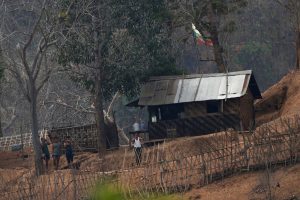A coalition of ethnic armed organizations in Myanmar will begin talks aimed at establishing a common front against the country’s military junta, as the air force increased its strikes on rebel-held territories in the east and north in the country.
On Tuesday, Myanmar Now reported that the Peace Process Steering Team (PPST), which brings together the 10 ethnic armed groups that have signed a Nationwide Ceasefire Agreement, will reach out to non-signatory groups in order to coordinate efforts to resist the coup government.
Col. Sai Nguen of the Restoration Council of Shan State, who serves as PPST’s spokesperson, told Myanmar Now that the grouping had agreed to the outreach during online meetings on Monday and Tuesday, and had formed a seven-member committee to coordinate the talks.
“Our intention is for [ethnic armed organizations] to be able to stand shoulder-to-shoulder with the other side in the future talks,” he said. “The new coalition is intended to create an all-inclusive environment. I understand that how much we will be able to do depends on our negotiations. This is just the initial step.”
The NCA was signed between the 10 groups and the Myanmar government in October 2015, as the prelude to a planned nationwide peace settlement. However, it excluded some of Myanmar’s most powerful ethnic armed groups, including several that occupy territories abutting the border with China.
Sai Nguen said that negotiations committee would approach most of these groups, which include the Kachin Independence Army, United Wa State Army, Shan State Progress Party, Ta’ang National Liberation Army, Myanmar National Democratic Alliance Army, Arakan Army, and the Karenni National Progressive Party.
In addition to plunging the country into crisis and pushing it to the brink of economic collapse, the military’s seizure of power on February 1 has derailed what remained of peace negotiations and inflamed tensions in outlying parts of the country.
This week, the Myanmar military, or Tatmadaw, launched airstrikes against ethnic minority fighters in two areas of the country. A spokesperson for the Kachin Independence Army (KIA) said that since Tuesday, the Tatmadaw has used heavy artillery and fighter jets to attack a position that the KIA seized last month. According to the U.N. Office for the Coordination of Humanitarian Affairs, clashes between the KIA and the Tatmadaw have escalated since mid-March, with almost 50 armed confrontations.
Meanwhile, in eastern Myanmar, government aircraft continued to carry out airstrikes in Karen State, after troops from the Karen National Union (KNU) overran an army base on the banks of the Salween River dividing Myanmar and Thailand earlier this week.
Among the ethnic armed groups, the KNU has been among the junta’s most vocal opponents, and has offered sanctuary to anti-coup activists from the central regions. The KNU and the Tatmadaw have engaged in intense fighting since February.
The PPST’s move raises the possibility of a greater degree of coordination between Myanmar’s 20-odd ethnic armed groups, and also with the broader anti-coup movement centered on the Committee Representing Pyidaungsu Hluttaw (CRPH), a group made up of elected parliamentarians from the ousted National League of Democracy government. On April 16, the CRPH announced the formation of an interim National Unity Government (NUG), which will seek to compete with the junta for recognition as Myanmar’s legitimate government. Thus far, the country’s ethnic armed organizations have expressed varying degrees of support for the CRPH and the NUG.
There are many obstacles to forming a consensus between Myanmar’s many armed groups. Every organization has its own history, objectives, and perceptions of the central state, and it remains doubtful that some, such as the United Wa State Army, would want to join. To succeed, the PPST will have to overcome a legacy of divide and rule by the Tatmadaw, which has been canny in brokering ceasefires with some groups while waging war on others, and never allowing them to form a united front.
While the receptiveness of ethnic armed groups to a further cooperation remains uncertain, few seem willing to cooperate with the military junta. Since the coup, the Tatmadaw has attempted to revive peace talks with various ethnic armed groups, as it did after its bloody suppression of nationwide protests in 1988, but has so far found little success.
There is a long way to go, and common opposition to the military does not necessarily translate into a positive alignment of aims, but any negotiations between the country’s ethnic armed groups conjure up the junta’s worst nightmare: an omnidirectional civil war between a loose alliance of ethnic armed groups, in addition to mass protests and simmering unrest in the heartland.

































